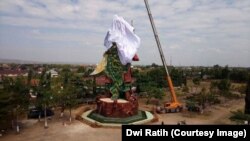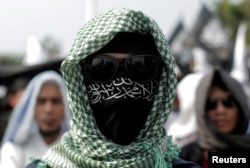Dozens of people from East Java community organizations rallied in Surabaya on Monday, demanding that a statue of a Chinese god be demolished.
Claiming the representation of a warrior god known variously as Kwan Sing Tee Koen, Kwan Kong, Kuan-Ti or Guan-Yu fails to reflect Indonesian culture, protesters gathered in front of the East Java Provincial Legislative Building to demand the statue’s demolition.
The brightly colored, 30-meter-tall statue at the Kwan Seng Bio temple in Tuban, East Java, is now draped in cloth. Local Chinese Indonesians, a minority in the world’s most populous Muslim nation, contend the protesters do not understand that the Confucian god marshals people against war. And a local official said the only problem with the statue is that it lacks a building permit, a snafu caused by an internal dispute at the temple.
Religious divides raise tension
The protest over the statue of the Chinese god comes during a time of religious tension in Indonesia.
In Jakarta, Islamist protests against the Chinese Christian governor, Basuki "Ahok" Purnama, turned violent during his recent re-election campaign. Purnama is now serving a two-year sentence for blasphemy after losing in April to Anies Baswedan, who was backed by hardline proponents of political Islam.
In July, President Joko “Jokowi” Widodo issued a decree banning the group Hizbut Tahrir, which advocates for a global Islamic caliphate. And while Indonesia is an officially secular country that recognizes six religions, Islamic sharia law has been on the rise.
Didik Muadi, who coordinated the Tuban protest, told local media that many consider the statue an insult to Indonesia. The enormous figure has dominated the local landscape since it was unveiled in July by Zulkifli Hasan, chairman of the People's Consultative Body, who told local media he hoped the statue would become a tourist attraction.
Statue's height seen as menacing
That didn’t sit well with Didik Maudi. “If they want to make a memorial statue, it should not be that high,” he said. “Maybe it should be a maximum of two meters, and inside the temple, if it is a memorial. This statue is so tall, it’s as if the god of war has taken over Tuban, and we can’t allow that!”
The chairman of the Regional Association of Chinese-Indonesians in East Java, Gatot Santosom, said the Tuban protest was based on a lack of understanding of the god depicted.
“They misunderstood and thought the statue is of a general, that we worship a war general, but that’s not true,” said Gatot Santosom. “What we worship and respect is what he symbolizes - loyalty, our loyalty to humanity - and he defends justice. That's what we worship, not the war, no.”
Where's the building permit?
Abu Cholifah, a member of the Tuban Regency Legislative Body, said the debate about the Tuban temple statue was an effort by outsiders who wanted to turn a statue of a Chinese god into a political issue in a nation with a long history of persecuting the Chinese community.
“The people of Tuban, actually, have no problem with it, because the statue has been there for some time,” said Abu Cholifah. “I think [outsiders] politicized the issue for their own interests. As far as the people of Tuban, no one is politicizing the statue."
If there is any issue with the statue, Abu Cholifah said, it is that the local government failed to issue a building permit before it was erected.
“Every building in Tuban must have an IMB," Abu Cholifah said. "But because there is an internal conflict in terms of management of the temple as a foundation,” no IMB was issued.







